Reflection on Consent in Nursing Practice: A Student's Perspective
VerifiedAdded on 2023/04/22
|9
|2235
|205
Essay
AI Summary
This essay presents a reflective account of a nursing student's journey in understanding and applying the concept of consent within the context of their nursing practice. The student, drawing upon personal experiences and coursework, explores the evolution of their understanding of consent, highlighting the importance of informed consent, patient autonomy, and the ethical and legal frameworks that govern nursing practice. The essay delves into various relevant acts, such as the Mental Capacity Act and the Human Rights Act, and discusses the significance of the NMC code of conduct. The student reflects on the practical implications of consent, including verbal, written, and non-verbal forms, and how it relates to their future roles and responsibilities. The essay uses Gibbs' reflective framework to analyze the experience, linking the chosen theme of consent with other modules and topics, such as spirituality. The conclusion outlines the student's plans for future learning and professional development, emphasizing the importance of staying informed about relevant legislation and guidelines to enhance their skills, knowledge, and competence in the field of nursing.
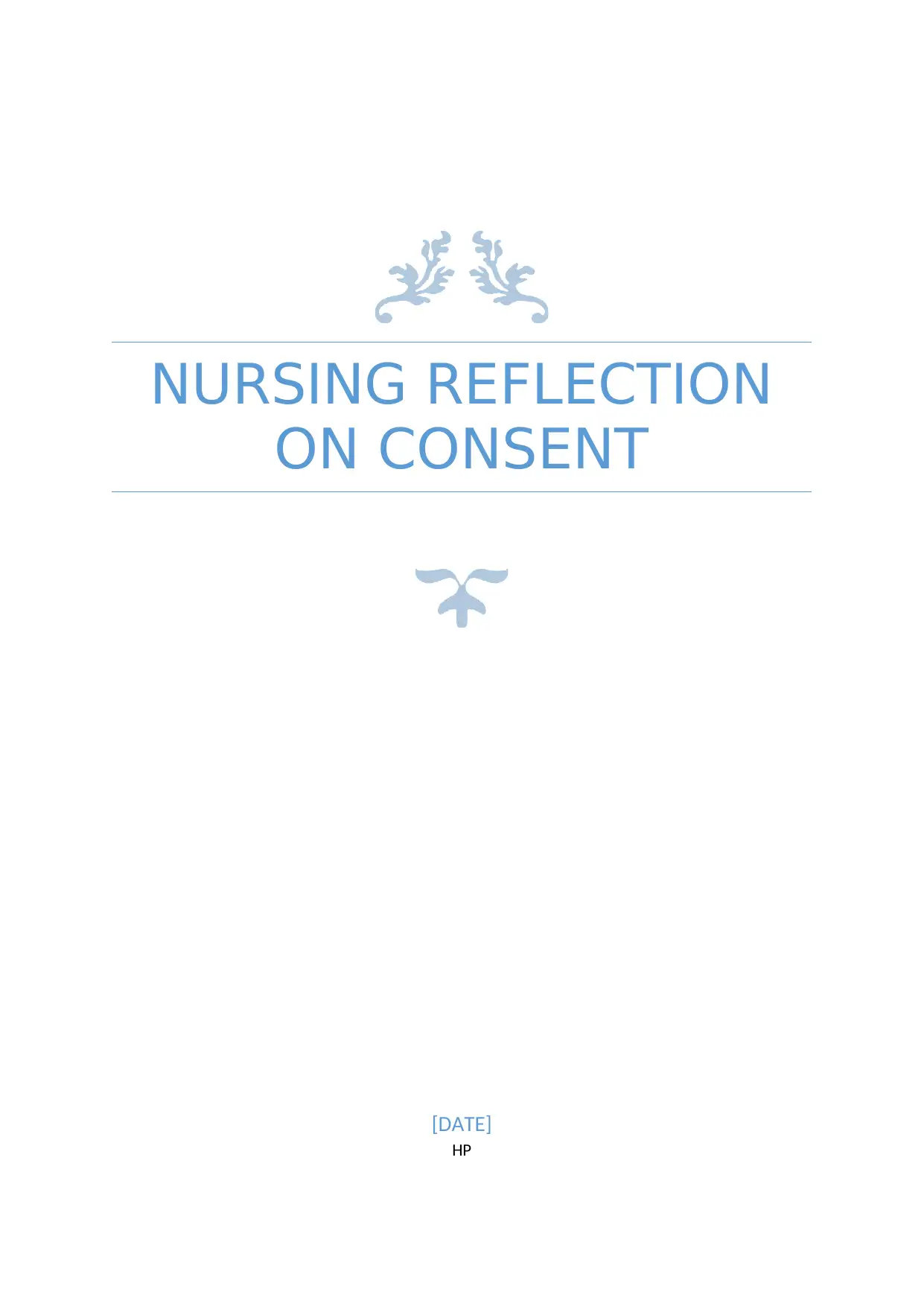
NURSING REFLECTION
ON CONSENT
[DATE]
HP
ON CONSENT
[DATE]
HP
Paraphrase This Document
Need a fresh take? Get an instant paraphrase of this document with our AI Paraphraser
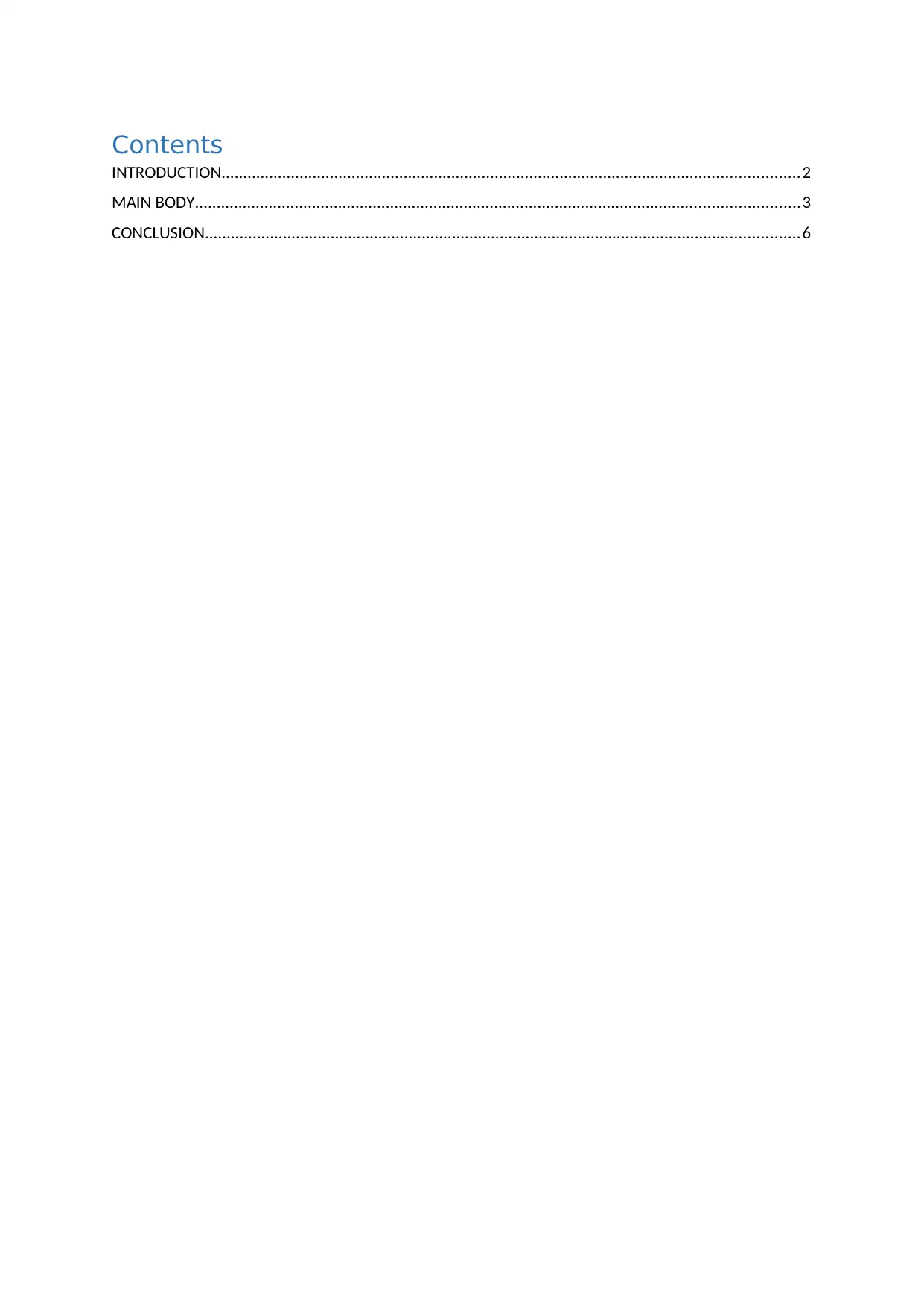
Contents
INTRODUCTION.....................................................................................................................................2
MAIN BODY...........................................................................................................................................3
CONCLUSION.........................................................................................................................................6
INTRODUCTION.....................................................................................................................................2
MAIN BODY...........................................................................................................................................3
CONCLUSION.........................................................................................................................................6
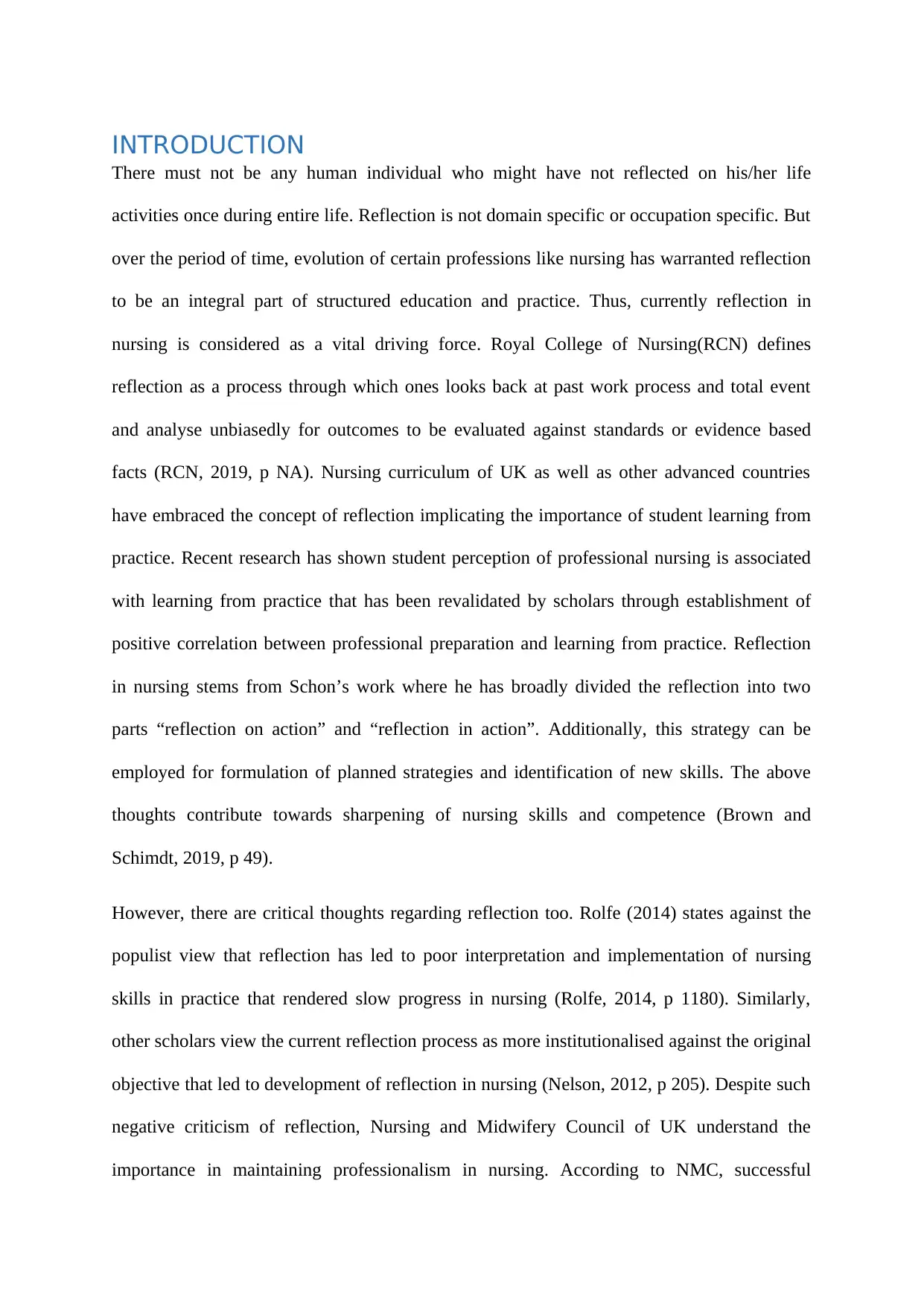
INTRODUCTION
There must not be any human individual who might have not reflected on his/her life
activities once during entire life. Reflection is not domain specific or occupation specific. But
over the period of time, evolution of certain professions like nursing has warranted reflection
to be an integral part of structured education and practice. Thus, currently reflection in
nursing is considered as a vital driving force. Royal College of Nursing(RCN) defines
reflection as a process through which ones looks back at past work process and total event
and analyse unbiasedly for outcomes to be evaluated against standards or evidence based
facts (RCN, 2019, p NA). Nursing curriculum of UK as well as other advanced countries
have embraced the concept of reflection implicating the importance of student learning from
practice. Recent research has shown student perception of professional nursing is associated
with learning from practice that has been revalidated by scholars through establishment of
positive correlation between professional preparation and learning from practice. Reflection
in nursing stems from Schon’s work where he has broadly divided the reflection into two
parts “reflection on action” and “reflection in action”. Additionally, this strategy can be
employed for formulation of planned strategies and identification of new skills. The above
thoughts contribute towards sharpening of nursing skills and competence (Brown and
Schimdt, 2019, p 49).
However, there are critical thoughts regarding reflection too. Rolfe (2014) states against the
populist view that reflection has led to poor interpretation and implementation of nursing
skills in practice that rendered slow progress in nursing (Rolfe, 2014, p 1180). Similarly,
other scholars view the current reflection process as more institutionalised against the original
objective that led to development of reflection in nursing (Nelson, 2012, p 205). Despite such
negative criticism of reflection, Nursing and Midwifery Council of UK understand the
importance in maintaining professionalism in nursing. According to NMC, successful
There must not be any human individual who might have not reflected on his/her life
activities once during entire life. Reflection is not domain specific or occupation specific. But
over the period of time, evolution of certain professions like nursing has warranted reflection
to be an integral part of structured education and practice. Thus, currently reflection in
nursing is considered as a vital driving force. Royal College of Nursing(RCN) defines
reflection as a process through which ones looks back at past work process and total event
and analyse unbiasedly for outcomes to be evaluated against standards or evidence based
facts (RCN, 2019, p NA). Nursing curriculum of UK as well as other advanced countries
have embraced the concept of reflection implicating the importance of student learning from
practice. Recent research has shown student perception of professional nursing is associated
with learning from practice that has been revalidated by scholars through establishment of
positive correlation between professional preparation and learning from practice. Reflection
in nursing stems from Schon’s work where he has broadly divided the reflection into two
parts “reflection on action” and “reflection in action”. Additionally, this strategy can be
employed for formulation of planned strategies and identification of new skills. The above
thoughts contribute towards sharpening of nursing skills and competence (Brown and
Schimdt, 2019, p 49).
However, there are critical thoughts regarding reflection too. Rolfe (2014) states against the
populist view that reflection has led to poor interpretation and implementation of nursing
skills in practice that rendered slow progress in nursing (Rolfe, 2014, p 1180). Similarly,
other scholars view the current reflection process as more institutionalised against the original
objective that led to development of reflection in nursing (Nelson, 2012, p 205). Despite such
negative criticism of reflection, Nursing and Midwifery Council of UK understand the
importance in maintaining professionalism in nursing. According to NMC, successful
⊘ This is a preview!⊘
Do you want full access?
Subscribe today to unlock all pages.

Trusted by 1+ million students worldwide
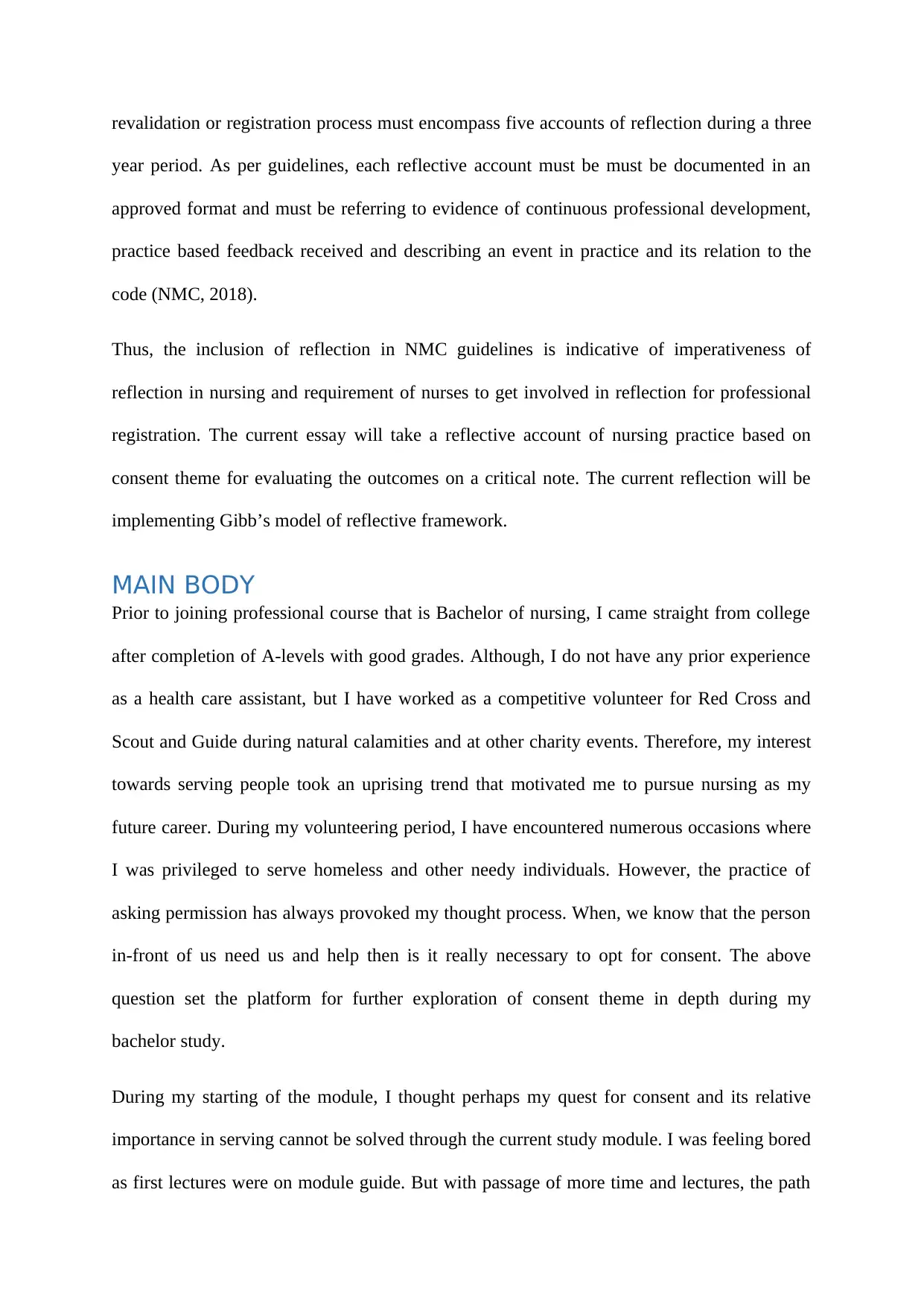
revalidation or registration process must encompass five accounts of reflection during a three
year period. As per guidelines, each reflective account must be must be documented in an
approved format and must be referring to evidence of continuous professional development,
practice based feedback received and describing an event in practice and its relation to the
code (NMC, 2018).
Thus, the inclusion of reflection in NMC guidelines is indicative of imperativeness of
reflection in nursing and requirement of nurses to get involved in reflection for professional
registration. The current essay will take a reflective account of nursing practice based on
consent theme for evaluating the outcomes on a critical note. The current reflection will be
implementing Gibb’s model of reflective framework.
MAIN BODY
Prior to joining professional course that is Bachelor of nursing, I came straight from college
after completion of A-levels with good grades. Although, I do not have any prior experience
as a health care assistant, but I have worked as a competitive volunteer for Red Cross and
Scout and Guide during natural calamities and at other charity events. Therefore, my interest
towards serving people took an uprising trend that motivated me to pursue nursing as my
future career. During my volunteering period, I have encountered numerous occasions where
I was privileged to serve homeless and other needy individuals. However, the practice of
asking permission has always provoked my thought process. When, we know that the person
in-front of us need us and help then is it really necessary to opt for consent. The above
question set the platform for further exploration of consent theme in depth during my
bachelor study.
During my starting of the module, I thought perhaps my quest for consent and its relative
importance in serving cannot be solved through the current study module. I was feeling bored
as first lectures were on module guide. But with passage of more time and lectures, the path
year period. As per guidelines, each reflective account must be must be documented in an
approved format and must be referring to evidence of continuous professional development,
practice based feedback received and describing an event in practice and its relation to the
code (NMC, 2018).
Thus, the inclusion of reflection in NMC guidelines is indicative of imperativeness of
reflection in nursing and requirement of nurses to get involved in reflection for professional
registration. The current essay will take a reflective account of nursing practice based on
consent theme for evaluating the outcomes on a critical note. The current reflection will be
implementing Gibb’s model of reflective framework.
MAIN BODY
Prior to joining professional course that is Bachelor of nursing, I came straight from college
after completion of A-levels with good grades. Although, I do not have any prior experience
as a health care assistant, but I have worked as a competitive volunteer for Red Cross and
Scout and Guide during natural calamities and at other charity events. Therefore, my interest
towards serving people took an uprising trend that motivated me to pursue nursing as my
future career. During my volunteering period, I have encountered numerous occasions where
I was privileged to serve homeless and other needy individuals. However, the practice of
asking permission has always provoked my thought process. When, we know that the person
in-front of us need us and help then is it really necessary to opt for consent. The above
question set the platform for further exploration of consent theme in depth during my
bachelor study.
During my starting of the module, I thought perhaps my quest for consent and its relative
importance in serving cannot be solved through the current study module. I was feeling bored
as first lectures were on module guide. But with passage of more time and lectures, the path
Paraphrase This Document
Need a fresh take? Get an instant paraphrase of this document with our AI Paraphraser
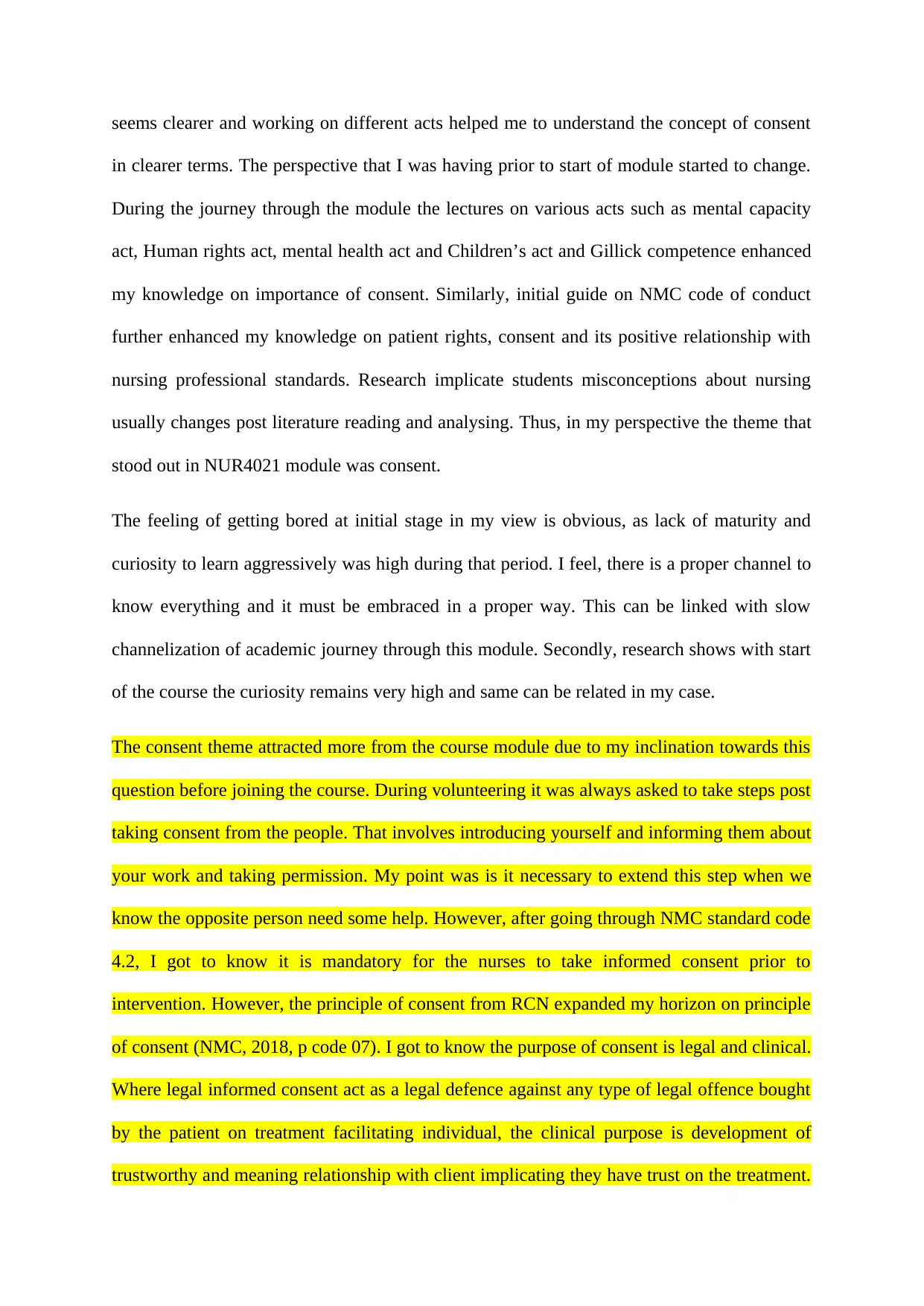
seems clearer and working on different acts helped me to understand the concept of consent
in clearer terms. The perspective that I was having prior to start of module started to change.
During the journey through the module the lectures on various acts such as mental capacity
act, Human rights act, mental health act and Children’s act and Gillick competence enhanced
my knowledge on importance of consent. Similarly, initial guide on NMC code of conduct
further enhanced my knowledge on patient rights, consent and its positive relationship with
nursing professional standards. Research implicate students misconceptions about nursing
usually changes post literature reading and analysing. Thus, in my perspective the theme that
stood out in NUR4021 module was consent.
The feeling of getting bored at initial stage in my view is obvious, as lack of maturity and
curiosity to learn aggressively was high during that period. I feel, there is a proper channel to
know everything and it must be embraced in a proper way. This can be linked with slow
channelization of academic journey through this module. Secondly, research shows with start
of the course the curiosity remains very high and same can be related in my case.
The consent theme attracted more from the course module due to my inclination towards this
question before joining the course. During volunteering it was always asked to take steps post
taking consent from the people. That involves introducing yourself and informing them about
your work and taking permission. My point was is it necessary to extend this step when we
know the opposite person need some help. However, after going through NMC standard code
4.2, I got to know it is mandatory for the nurses to take informed consent prior to
intervention. However, the principle of consent from RCN expanded my horizon on principle
of consent (NMC, 2018, p code 07). I got to know the purpose of consent is legal and clinical.
Where legal informed consent act as a legal defence against any type of legal offence bought
by the patient on treatment facilitating individual, the clinical purpose is development of
trustworthy and meaning relationship with client implicating they have trust on the treatment.
in clearer terms. The perspective that I was having prior to start of module started to change.
During the journey through the module the lectures on various acts such as mental capacity
act, Human rights act, mental health act and Children’s act and Gillick competence enhanced
my knowledge on importance of consent. Similarly, initial guide on NMC code of conduct
further enhanced my knowledge on patient rights, consent and its positive relationship with
nursing professional standards. Research implicate students misconceptions about nursing
usually changes post literature reading and analysing. Thus, in my perspective the theme that
stood out in NUR4021 module was consent.
The feeling of getting bored at initial stage in my view is obvious, as lack of maturity and
curiosity to learn aggressively was high during that period. I feel, there is a proper channel to
know everything and it must be embraced in a proper way. This can be linked with slow
channelization of academic journey through this module. Secondly, research shows with start
of the course the curiosity remains very high and same can be related in my case.
The consent theme attracted more from the course module due to my inclination towards this
question before joining the course. During volunteering it was always asked to take steps post
taking consent from the people. That involves introducing yourself and informing them about
your work and taking permission. My point was is it necessary to extend this step when we
know the opposite person need some help. However, after going through NMC standard code
4.2, I got to know it is mandatory for the nurses to take informed consent prior to
intervention. However, the principle of consent from RCN expanded my horizon on principle
of consent (NMC, 2018, p code 07). I got to know the purpose of consent is legal and clinical.
Where legal informed consent act as a legal defence against any type of legal offence bought
by the patient on treatment facilitating individual, the clinical purpose is development of
trustworthy and meaning relationship with client implicating they have trust on the treatment.
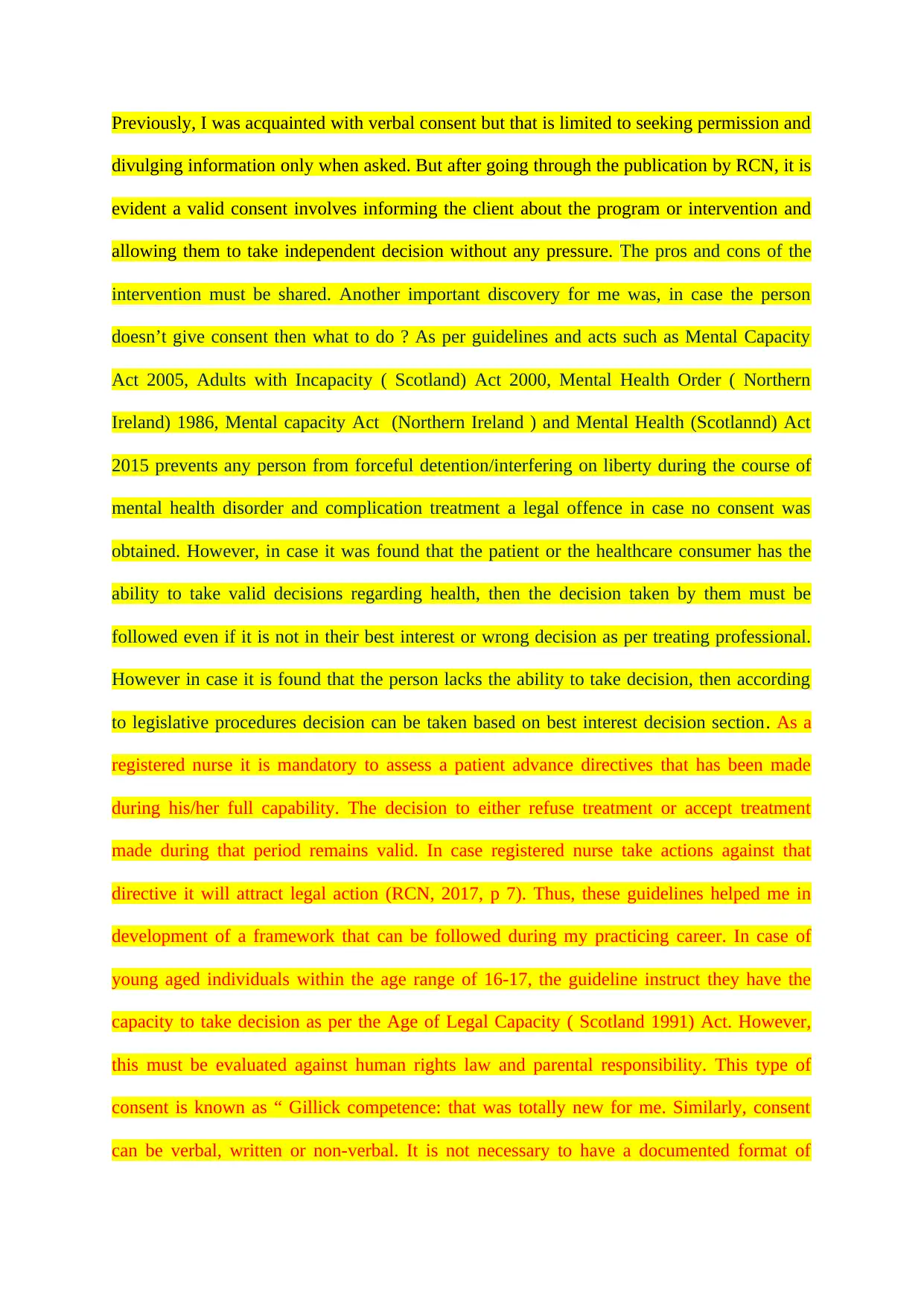
Previously, I was acquainted with verbal consent but that is limited to seeking permission and
divulging information only when asked. But after going through the publication by RCN, it is
evident a valid consent involves informing the client about the program or intervention and
allowing them to take independent decision without any pressure. The pros and cons of the
intervention must be shared. Another important discovery for me was, in case the person
doesn’t give consent then what to do ? As per guidelines and acts such as Mental Capacity
Act 2005, Adults with Incapacity ( Scotland) Act 2000, Mental Health Order ( Northern
Ireland) 1986, Mental capacity Act (Northern Ireland ) and Mental Health (Scotlannd) Act
2015 prevents any person from forceful detention/interfering on liberty during the course of
mental health disorder and complication treatment a legal offence in case no consent was
obtained. However, in case it was found that the patient or the healthcare consumer has the
ability to take valid decisions regarding health, then the decision taken by them must be
followed even if it is not in their best interest or wrong decision as per treating professional.
However in case it is found that the person lacks the ability to take decision, then according
to legislative procedures decision can be taken based on best interest decision section. As a
registered nurse it is mandatory to assess a patient advance directives that has been made
during his/her full capability. The decision to either refuse treatment or accept treatment
made during that period remains valid. In case registered nurse take actions against that
directive it will attract legal action (RCN, 2017, p 7). Thus, these guidelines helped me in
development of a framework that can be followed during my practicing career. In case of
young aged individuals within the age range of 16-17, the guideline instruct they have the
capacity to take decision as per the Age of Legal Capacity ( Scotland 1991) Act. However,
this must be evaluated against human rights law and parental responsibility. This type of
consent is known as “ Gillick competence: that was totally new for me. Similarly, consent
can be verbal, written or non-verbal. It is not necessary to have a documented format of
divulging information only when asked. But after going through the publication by RCN, it is
evident a valid consent involves informing the client about the program or intervention and
allowing them to take independent decision without any pressure. The pros and cons of the
intervention must be shared. Another important discovery for me was, in case the person
doesn’t give consent then what to do ? As per guidelines and acts such as Mental Capacity
Act 2005, Adults with Incapacity ( Scotland) Act 2000, Mental Health Order ( Northern
Ireland) 1986, Mental capacity Act (Northern Ireland ) and Mental Health (Scotlannd) Act
2015 prevents any person from forceful detention/interfering on liberty during the course of
mental health disorder and complication treatment a legal offence in case no consent was
obtained. However, in case it was found that the patient or the healthcare consumer has the
ability to take valid decisions regarding health, then the decision taken by them must be
followed even if it is not in their best interest or wrong decision as per treating professional.
However in case it is found that the person lacks the ability to take decision, then according
to legislative procedures decision can be taken based on best interest decision section. As a
registered nurse it is mandatory to assess a patient advance directives that has been made
during his/her full capability. The decision to either refuse treatment or accept treatment
made during that period remains valid. In case registered nurse take actions against that
directive it will attract legal action (RCN, 2017, p 7). Thus, these guidelines helped me in
development of a framework that can be followed during my practicing career. In case of
young aged individuals within the age range of 16-17, the guideline instruct they have the
capacity to take decision as per the Age of Legal Capacity ( Scotland 1991) Act. However,
this must be evaluated against human rights law and parental responsibility. This type of
consent is known as “ Gillick competence: that was totally new for me. Similarly, consent
can be verbal, written or non-verbal. It is not necessary to have a documented format of
⊘ This is a preview!⊘
Do you want full access?
Subscribe today to unlock all pages.

Trusted by 1+ million students worldwide
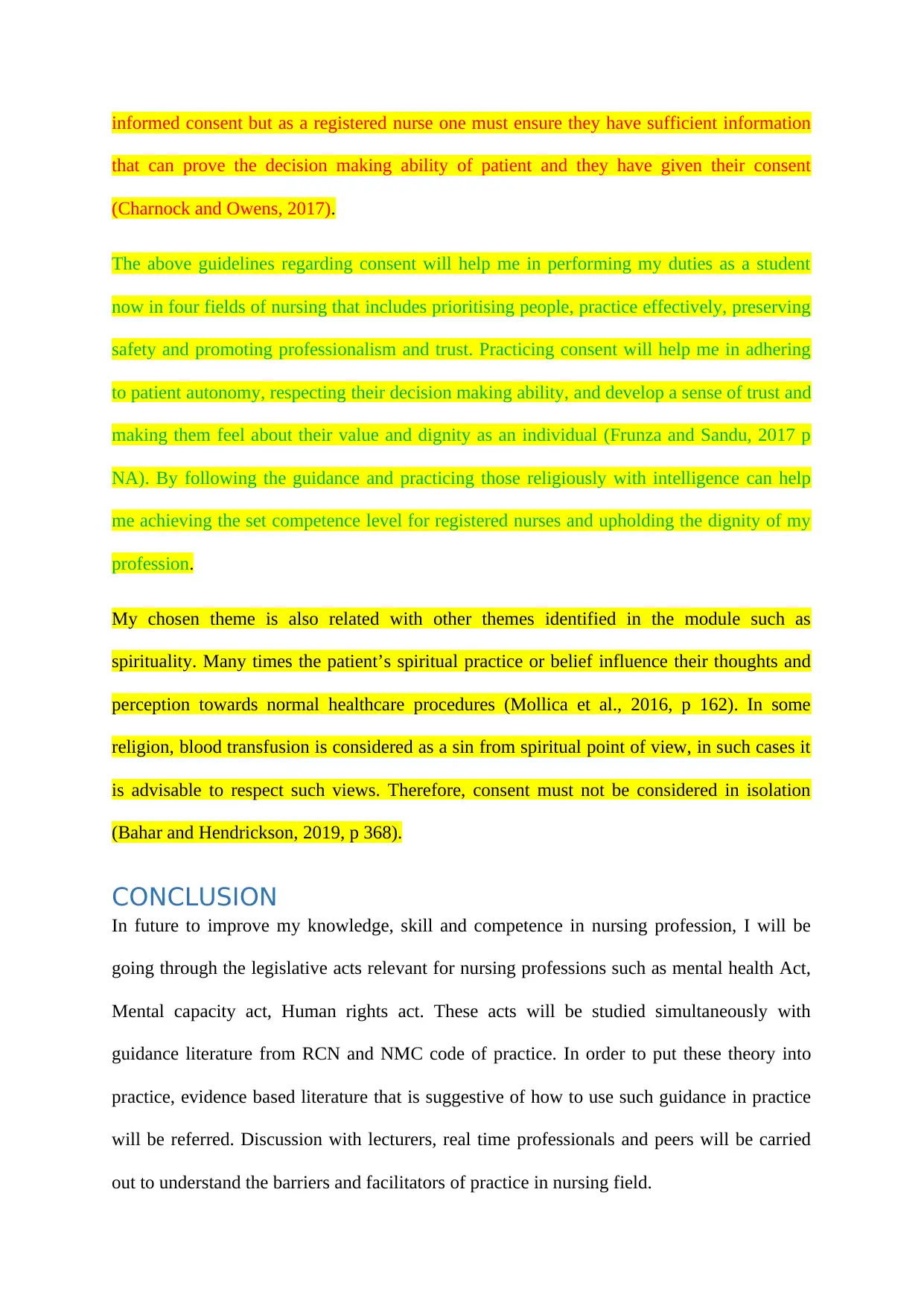
informed consent but as a registered nurse one must ensure they have sufficient information
that can prove the decision making ability of patient and they have given their consent
(Charnock and Owens, 2017).
The above guidelines regarding consent will help me in performing my duties as a student
now in four fields of nursing that includes prioritising people, practice effectively, preserving
safety and promoting professionalism and trust. Practicing consent will help me in adhering
to patient autonomy, respecting their decision making ability, and develop a sense of trust and
making them feel about their value and dignity as an individual (Frunza and Sandu, 2017 p
NA). By following the guidance and practicing those religiously with intelligence can help
me achieving the set competence level for registered nurses and upholding the dignity of my
profession.
My chosen theme is also related with other themes identified in the module such as
spirituality. Many times the patient’s spiritual practice or belief influence their thoughts and
perception towards normal healthcare procedures (Mollica et al., 2016, p 162). In some
religion, blood transfusion is considered as a sin from spiritual point of view, in such cases it
is advisable to respect such views. Therefore, consent must not be considered in isolation
(Bahar and Hendrickson, 2019, p 368).
CONCLUSION
In future to improve my knowledge, skill and competence in nursing profession, I will be
going through the legislative acts relevant for nursing professions such as mental health Act,
Mental capacity act, Human rights act. These acts will be studied simultaneously with
guidance literature from RCN and NMC code of practice. In order to put these theory into
practice, evidence based literature that is suggestive of how to use such guidance in practice
will be referred. Discussion with lecturers, real time professionals and peers will be carried
out to understand the barriers and facilitators of practice in nursing field.
that can prove the decision making ability of patient and they have given their consent
(Charnock and Owens, 2017).
The above guidelines regarding consent will help me in performing my duties as a student
now in four fields of nursing that includes prioritising people, practice effectively, preserving
safety and promoting professionalism and trust. Practicing consent will help me in adhering
to patient autonomy, respecting their decision making ability, and develop a sense of trust and
making them feel about their value and dignity as an individual (Frunza and Sandu, 2017 p
NA). By following the guidance and practicing those religiously with intelligence can help
me achieving the set competence level for registered nurses and upholding the dignity of my
profession.
My chosen theme is also related with other themes identified in the module such as
spirituality. Many times the patient’s spiritual practice or belief influence their thoughts and
perception towards normal healthcare procedures (Mollica et al., 2016, p 162). In some
religion, blood transfusion is considered as a sin from spiritual point of view, in such cases it
is advisable to respect such views. Therefore, consent must not be considered in isolation
(Bahar and Hendrickson, 2019, p 368).
CONCLUSION
In future to improve my knowledge, skill and competence in nursing profession, I will be
going through the legislative acts relevant for nursing professions such as mental health Act,
Mental capacity act, Human rights act. These acts will be studied simultaneously with
guidance literature from RCN and NMC code of practice. In order to put these theory into
practice, evidence based literature that is suggestive of how to use such guidance in practice
will be referred. Discussion with lecturers, real time professionals and peers will be carried
out to understand the barriers and facilitators of practice in nursing field.
Paraphrase This Document
Need a fresh take? Get an instant paraphrase of this document with our AI Paraphraser
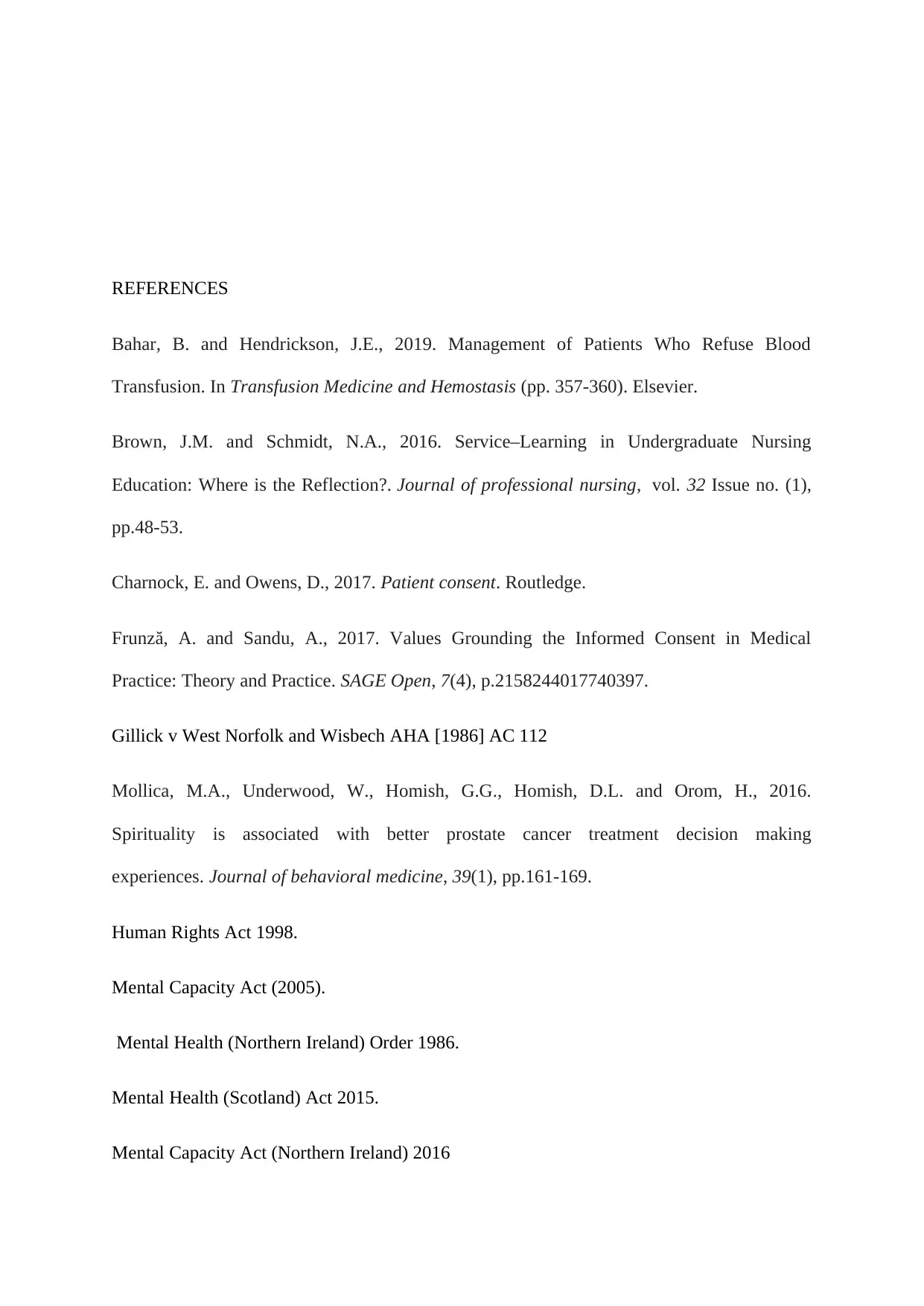
REFERENCES
Bahar, B. and Hendrickson, J.E., 2019. Management of Patients Who Refuse Blood
Transfusion. In Transfusion Medicine and Hemostasis (pp. 357-360). Elsevier.
Brown, J.M. and Schmidt, N.A., 2016. Service–Learning in Undergraduate Nursing
Education: Where is the Reflection?. Journal of professional nursing, vol. 32 Issue no. (1),
pp.48-53.
Charnock, E. and Owens, D., 2017. Patient consent. Routledge.
Frunză, A. and Sandu, A., 2017. Values Grounding the Informed Consent in Medical
Practice: Theory and Practice. SAGE Open, 7(4), p.2158244017740397.
Gillick v West Norfolk and Wisbech AHA [1986] AC 112
Mollica, M.A., Underwood, W., Homish, G.G., Homish, D.L. and Orom, H., 2016.
Spirituality is associated with better prostate cancer treatment decision making
experiences. Journal of behavioral medicine, 39(1), pp.161-169.
Human Rights Act 1998.
Mental Capacity Act (2005).
Mental Health (Northern Ireland) Order 1986.
Mental Health (Scotland) Act 2015.
Mental Capacity Act (Northern Ireland) 2016
Bahar, B. and Hendrickson, J.E., 2019. Management of Patients Who Refuse Blood
Transfusion. In Transfusion Medicine and Hemostasis (pp. 357-360). Elsevier.
Brown, J.M. and Schmidt, N.A., 2016. Service–Learning in Undergraduate Nursing
Education: Where is the Reflection?. Journal of professional nursing, vol. 32 Issue no. (1),
pp.48-53.
Charnock, E. and Owens, D., 2017. Patient consent. Routledge.
Frunză, A. and Sandu, A., 2017. Values Grounding the Informed Consent in Medical
Practice: Theory and Practice. SAGE Open, 7(4), p.2158244017740397.
Gillick v West Norfolk and Wisbech AHA [1986] AC 112
Mollica, M.A., Underwood, W., Homish, G.G., Homish, D.L. and Orom, H., 2016.
Spirituality is associated with better prostate cancer treatment decision making
experiences. Journal of behavioral medicine, 39(1), pp.161-169.
Human Rights Act 1998.
Mental Capacity Act (2005).
Mental Health (Northern Ireland) Order 1986.
Mental Health (Scotland) Act 2015.
Mental Capacity Act (Northern Ireland) 2016
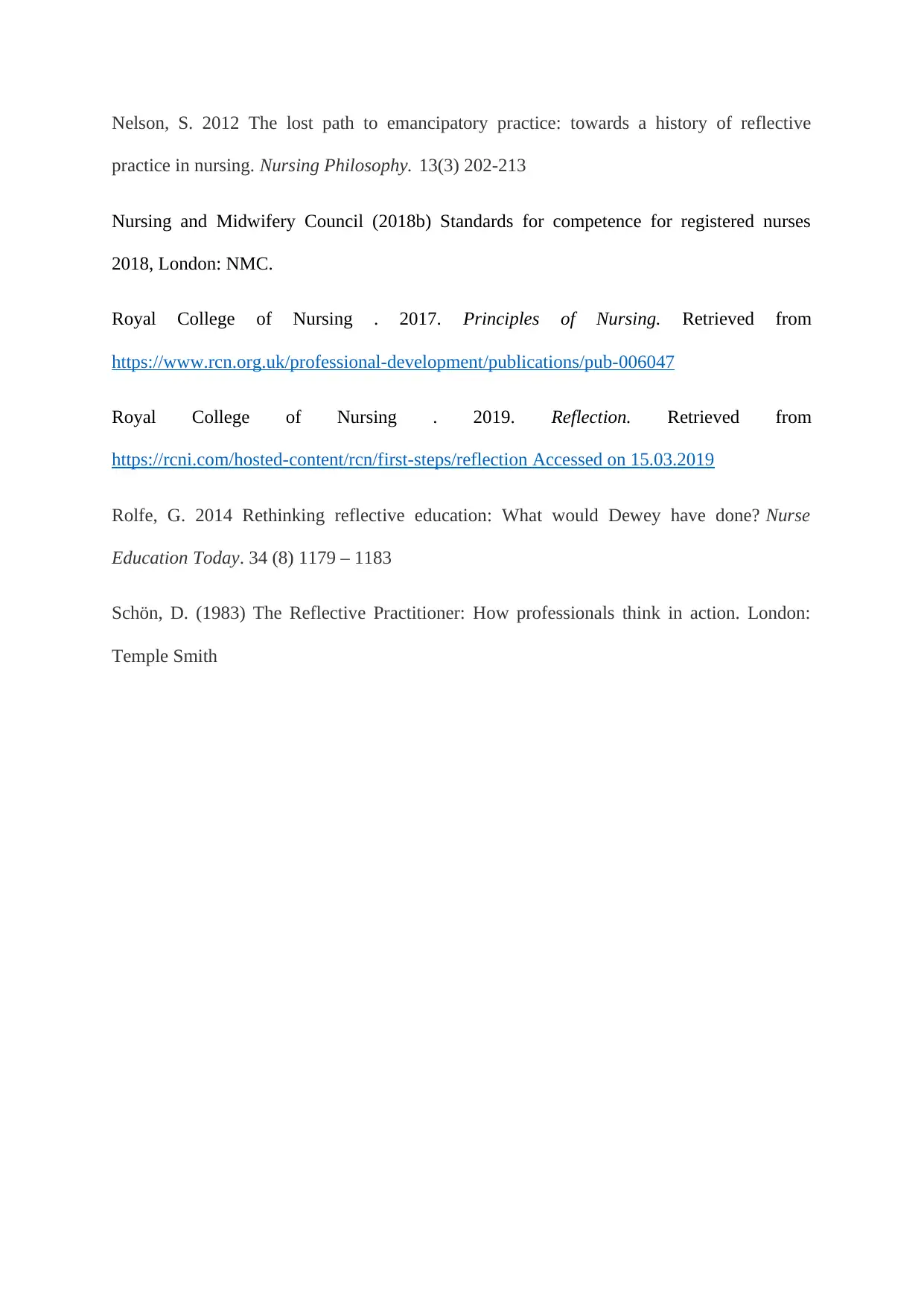
Nelson, S. 2012 The lost path to emancipatory practice: towards a history of reflective
practice in nursing. Nursing Philosophy. 13(3) 202-213
Nursing and Midwifery Council (2018b) Standards for competence for registered nurses
2018, London: NMC.
Royal College of Nursing . 2017. Principles of Nursing. Retrieved from
https://www.rcn.org.uk/professional-development/publications/pub-006047
Royal College of Nursing . 2019. Reflection. Retrieved from
https://rcni.com/hosted-content/rcn/first-steps/reflection Accessed on 15.03.2019
Rolfe, G. 2014 Rethinking reflective education: What would Dewey have done? Nurse
Education Today. 34 (8) 1179 – 1183
Schön, D. (1983) The Reflective Practitioner: How professionals think in action. London:
Temple Smith
practice in nursing. Nursing Philosophy. 13(3) 202-213
Nursing and Midwifery Council (2018b) Standards for competence for registered nurses
2018, London: NMC.
Royal College of Nursing . 2017. Principles of Nursing. Retrieved from
https://www.rcn.org.uk/professional-development/publications/pub-006047
Royal College of Nursing . 2019. Reflection. Retrieved from
https://rcni.com/hosted-content/rcn/first-steps/reflection Accessed on 15.03.2019
Rolfe, G. 2014 Rethinking reflective education: What would Dewey have done? Nurse
Education Today. 34 (8) 1179 – 1183
Schön, D. (1983) The Reflective Practitioner: How professionals think in action. London:
Temple Smith
⊘ This is a preview!⊘
Do you want full access?
Subscribe today to unlock all pages.

Trusted by 1+ million students worldwide
1 out of 9
Your All-in-One AI-Powered Toolkit for Academic Success.
+13062052269
info@desklib.com
Available 24*7 on WhatsApp / Email
![[object Object]](/_next/static/media/star-bottom.7253800d.svg)
Unlock your academic potential
Copyright © 2020–2025 A2Z Services. All Rights Reserved. Developed and managed by ZUCOL.

